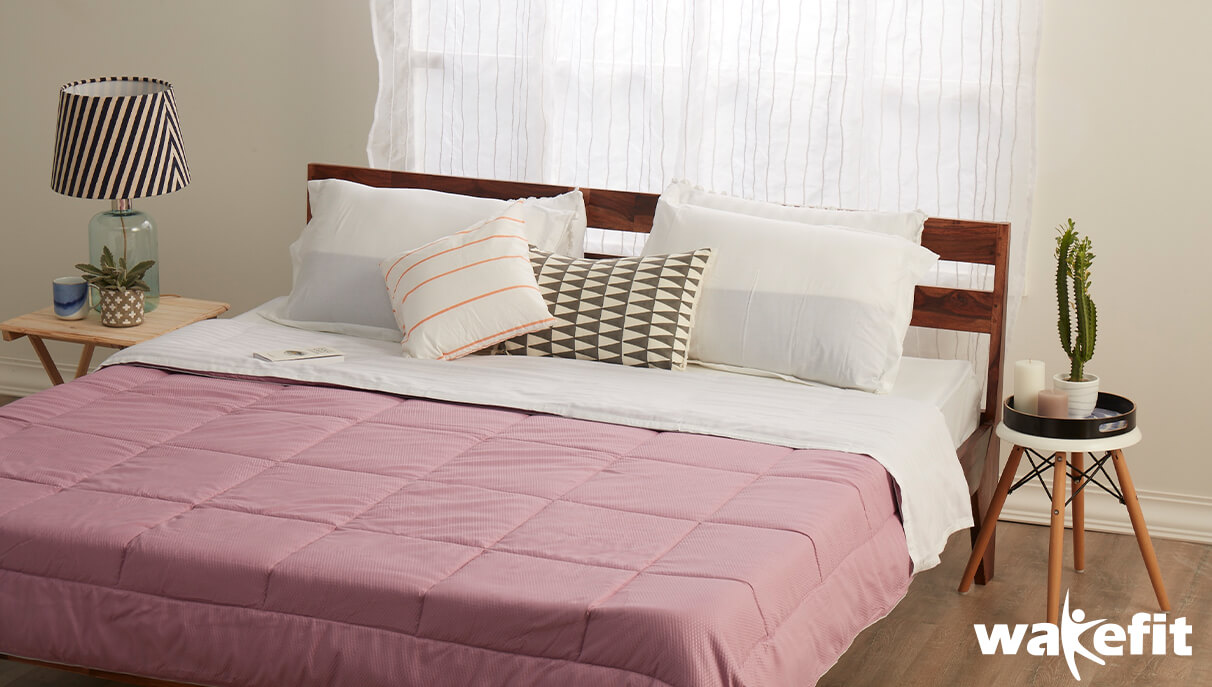While some people swear by six hours of sleep, others struggle to function without their full eight hours. The truth is, sleep needs vary from person to person, but consistently cutting corners on rest can take a toll on your health and well-being.
Sleep deprivation is extremely common in today’s digital world and that’s where your schedule and environment come in. The mattress you pick plays a big role in the quality of your sleep. The right one can help you fall asleep faster, stay comfortable all night, and wake up refreshed, while the wrong one can leave you tossing and turning.
But how much sleep do you actually need? What type of mattress can help you sleep better? And what are the simple sleep habit improvements you can do?
Whether you’re a night owl, an early bird, or just trying to survive on coffee, it’s time to put your sleep (and health) first. Let’s get started!
Understanding Sleep Needs
Sleep plays an important role in your health, but the amount required depends on age. Let’s break down the average sleep needs by age so you can better understand how much rest is right for you.
Average Sleep Needs by Age
- Infants (0-1 year): Babies need 14 to 17 hours of sleep every day. Their bodies are growing rapidly, and sleep supports brain development, physical growth, and mental processing. Babies process everything they experience during their naps, so ample rest is essential.
- Teenagers (14-17 years): Teenagers need around 8 to 10 hours of sleep each night. Puberty and rapid growth require more recovery time. Sleep also helps with academic performance, emotional stability, and physical activities like sports.
- Adults (18-64 years): Most adults need 7 to 9 hours of sleep for optimal health. Rest helps in muscle repair, cognitive function, and stress recovery. While some adults may get by on less sleep, consistently falling short increases the risk of health problems.
- Seniors (65+ years): Seniors typically need 7 to 8 hours of sleep, but may experience lighter sleep or wake up more frequently. Changes in sleep patterns are normal with age, but maintaining a good sleep routine is crucial for memory, mental sharpness, and overall health.
Factors Influencing Sleep Needs
Several factors determine how much sleep you actually need. Here’s what affects your sleep:
- Physical activity: People who exercise regularly or have physically demanding jobs often need more sleep. Rest helps repair muscles, restore energy, and reduce inflammation, making sleep vital for recovery.
- Stress levels: Stress impacts sleep in significant ways. High-stress periods often lead to restless nights or increased sleep needs, as your body works to manage both mental and physical strain.
- Health conditions: When dealing with illness, injury, or chronic conditions, more rest is required for the body to heal. Sleep boosts your immune system and helps your body recover faster. People with mental health conditions like anxiety may also require additional sleep.
- Mental health: Conditions such as anxiety or depression can affect your sleep patterns. Some may struggle with insomnia, while others oversleep. Both situations affect how rested you feel and may increase sleep needs.
- Lifestyle habits: Your routine directly impacts how much sleep you need. Late-night caffeine, irregular work hours, or frequent travel can disrupt your natural sleep cycle. Consistent sleep habits tend to result in better rest, while erratic schedules can leave you feeling more tired.
Is 6 Hours of Sleep Enough?
Many people wonder if 6 hours of sleep can truly be enough. While some manage on less sleep, most people need more for optimal health. Let’s explore how a lack of sleep affects your body and mind.
The Effects of Sleep Deprivation
Sleep deprivation has a range of negative effects on the body. Here’s what happens when you don’t get enough rest:
- Impaired concentration: Without enough sleep, it’s harder to focus, solve problems, or think clearly. Tasks that usually feel easy become challenging, and it’s difficult to stay on track.
- Weakened immune system: Sleep supports your immune system, so not getting enough rest makes you more vulnerable to illnesses. Your body has a harder time fighting off infections, colds, and viruses when sleep is compromised.
- Increased stress: Lack of sleep directly affects mood, leading to higher stress levels. Irritability and frustration become more common, and you may find yourself feeling overwhelmed by tasks that normally wouldn’t bother you.
- Higher risk of chronic conditions: Sleep deprivation increases the risk of serious health conditions, including heart disease, diabetes, and high blood pressure. Over time, lack of sleep puts added strain on your heart and blood vessels.
- Slower reaction times: Sleep-deprived individuals react more slowly, making activities like driving or operating machinery dangerous. Reaction times become comparable to those of someone under the influence of alcohol, raising the risk of accidents.
Symptoms of Sleep Deprivation
If you’re not getting enough sleep, your body will show clear signs. Here are the most common sleep deprivation symptoms:
- Constant drowsiness: Feeling tired throughout the day, even after what seems like a full night’s rest, could signal sleep deprivation. This drowsiness makes it difficult to stay alert or focused during important tasks.
- Difficulty concentrating: A tired brain has trouble processing information. You may find yourself zoning out during meetings or struggling to complete tasks that typically come easily. Your ability to focus and remember details diminishes significantly when sleep-deprived.
- Mood swings: Sleep deprivation affects emotional regulation. You might feel irritable, short-tempered, or even emotionally unstable. Over time, poor sleep can contribute to more serious emotional issues like anxiety or depression.
- Physical fatigue: Muscle weakness, lethargy, and overall exhaustion are common when you haven’t had enough rest. You may feel physically drained, even without intense physical activity, making it harder to carry out everyday activities.
- Memory problems: Sleep helps solidify memories, and without it, you may struggle to retain new information. Memory lapses and difficulty recalling details become common as sleep deprivation continues.
Does Your Mattress Play a Role in Sleep Quality?

Your mattress has a huge impact on how well you rest. The right mattress not only supports your body but also improves your sleep quality by promoting better posture and comfort throughout the night. Let’s look at how to choose the perfect mattress for good sleep based on individual needs.
Consider Your Sleeping Position
Your sleeping position affects the type of mattress that best suits you. Here’s how different positions require different levels of firmness and support:
- Side Sleepers:
Side sleepers need softer mattresses to cushion the pressure points on their hips and shoulders. A softer surface allows these areas to sink slightly, keeping the spine aligned and reducing the risk of developing aches or pains. A memory foam or pillow-top mattress usually works well for side sleepers. - Back Sleepers:
Back sleepers require a medium-firm mattress that supports the natural curve of the spine. Too soft, and the body may sink too deeply, causing misalignment. Too firm, and it may not provide enough comfort to relieve pressure on the lower back. A medium-firm hybrid or latex mattress is often ideal for back sleepers. - Stomach Sleepers:
Stomach sleepers generally need a firmer mattress to prevent the body from sinking too much. Sinking can strain the lower back and neck, leading to discomfort. A firm mattress helps keep the body aligned and minimizes the risk of waking up with aches. A firm innerspring or latex mattress usually provides the right level of support for stomach sleepers. - Combination Sleepers:
Those who switch positions throughout the night need a mattress that offers both support and adaptability. A medium-firm mattress is generally a good balance, as it can accommodate different sleeping positions without compromising comfort or alignment.
Understand Your Body Type
Your body type also plays a critical role in determining the right mattress. Here’s how different body weights and shapes influence your mattress needs:
- Heavier Individuals (Over 104 kgs):
Heavier sleepers require a firmer mattress to prevent excessive sinking, which can lead to misalignment of the spine and discomfort. Firmer mattresses offer more support to keep the spine in proper alignment. Hybrid mattresses with strong coils tend to provide the durability and support needed for heavier individuals. - Lighter Individuals (Under 58 kgs):
Lighter sleepers prefer softer mattresses because their bodies don’t sink as much into it. A softer surface provides more contouring and comfort, helping to relieve pressure on joints and muscles. Memory foam or plush mattresses are their first preference. - Average Weight Individuals (58-104 kgs):
People with an average body weight should choose a medium-firm mattress, which provides the right balance between comfort and support. This level of firmness ensures enough contouring to relieve pressure while maintaining spinal alignment. A hybrid mattress that combines foam and coils can work well for this body type, offering both cushioning and durability.
Read Reviews and Warranties:
It’s important to read reviews from people with similar sleep preferences to gauge the mattress’s performance. Also, check the warranty, as a longer warranty generally indicates a higher-quality mattress. A good warranty shows the manufacturer’s confidence in the durability of the product.
The Importance of Creating an Optimal Sleep Environment

Creating the perfect sleep environment is crucial for getting quality rest. Your entire sleep space, from the mattress to the room’s ambiance, significantly impacts how well you sleep. Improving this environment can help you meet your specific sleep needs and prevent the effects of not sleeping enough.
A comfortable mattress, supportive pillows, and a relaxing space all contribute to a restful night. Here are some simple ways to improve your sleep environment:
- Use the Right Pillow: The right pillow can reduce neck and back pain. Side sleepers need thicker pillows, while back sleepers benefit from medium-firm ones. A properly chosen pillow can greatly enhance your comfort.
- Adjust Lighting: Lighting directly affects your body’s sleep-wake cycle. Use dim lighting before bed to encourage relaxation, and blackout curtains to block external light, making it easier to fall and stay asleep.
- Set the Right Temperature: A cool room is ideal for restful sleep. Keep your room temperature between 15-19°C, as cooler environments help your body relax and prevent discomfort that could wake you up.
Making even small changes in your bedroom can improve the overall sleep experience. Investing in the right mattress and adjusting your surroundings can help you avoid the effects of not sleeping enough and improve how refreshed you feel each morning.
FAQs
Q1: How many hours of sleep is enough for an adult?
Most adults need 7 to 9 hours of sleep each night. This range supports recovery, memory processing, and overall health. Consistently sleeping less than 7 hours can cause poor focus, mood swings, and even lead to long-term health issues like heart disease. Some adults feel fine with slightly less sleep, but regularly cutting down can have lasting effects on both mental and physical well-being.
Q2: What are the symptoms of sleep deprivation?
Sleep deprivation can make you feel tired all day and cause difficulty concentrating. You may experience mood swings, irritability, and even increased forgetfulness. Physical symptoms like frequent illness or feeling sluggish are also common. The longer sleep deprivation continues, the worse these symptoms get, impacting both your productivity and health.
Q3: Can 6 hours of sleep be enough for some people?
Some people might feel okay with 6 hours of sleep, but most need closer to 7-9 hours to function properly. Regularly getting only 6 hours of sleep can lead to sleep debt, where the effects of missed rest build up over time. This can result in poor focus, increased stress, and higher health risks. Though a few may thrive on less sleep, it’s not the norm.
Q4: What are the effects of not sleeping enough?
Not getting enough sleep leads to tiredness, difficulty focusing, and irritability. Over time, the effects become more serious, including memory problems, weakened immunity, and weight gain. Long-term lack of sleep increases the risk of heart disease, diabetes, and mental health issues like anxiety and depression. Sleep is important for keeping both mind and body healthy.
Q5: How can I improve my sleep quality if I can’t get enough sleep?
Even if you can’t get 7-9 hours of sleep, you can improve your sleep quality with small changes. Keep a consistent sleep schedule, create a dark and cool sleep environment, and avoid screens before bed. Relaxation techniques like deep breathing can help, and reducing caffeine and heavy meals before bedtime can make a big difference. Over time, these adjustments can lead to better rest.




No Comments